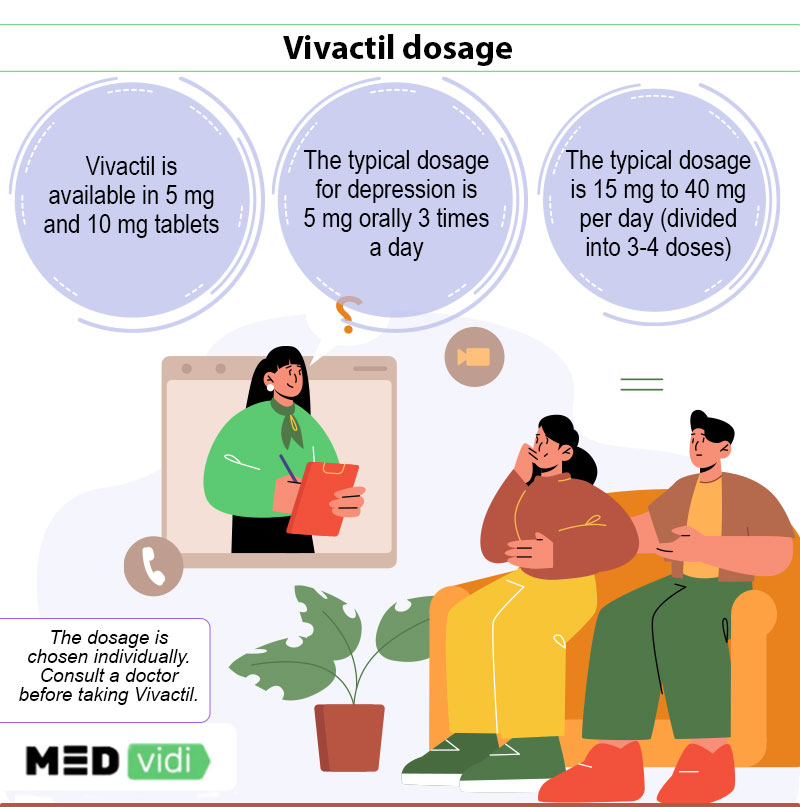Depression is a mental problem characterized by low mood and/or loss of interest in daily activities lasting 14 days or more. Other symptoms include sadness, lethargy, self-neglect, and changes in sleeping and eating patterns among the rest. In extreme cases, a person may have suicidal ideations.
According to National Survey on Drug Use and Health 2015-2020 data, approximately 10% of American adults struggle with the disorder annually. Fortunately, it is possible to treat and manage depression effectively. The treatment includes therapy, medication, or a combination of the two treatments. This post will observe how Vivactil can help manage this disorder.
Depression can become more serious if not treated. Consult a doctor to not let it become a severe disorder.
What is Vivactil
Vivactil is a brand name, while protriptyline is its generic name. The brand name Vivactil has been discontinued; however, the drug is still available in its generic form. It falls under the category of tricyclic antidepressants (TCA) class. The drug inhibits serotonin and norepinephrine neurotransmitters reuptake in the brain. It blocks the reuptake of the neurotransmitters such as serotonin and dopamine, which regulate mood and feelings.
Vivactil half-life is approximately 54 to 92 hours, after which it is eliminated from the body through urine. Even though it is not recommended as a first-line treatment for depression, protriptyline is an FDA-approved medication. Before taking it, one should consult a doctor to know more about the possible severe side effects.
Different Vivactil Uses
Vivactil treats psychiatric disorders such as depression and attention deficit hyperactivity disorder (ADHD). The medication is also a treatment for anxiety disorders, obsessive-compulsive disorder (OCD), headaches, and narcolepsy since it does not have sedative effects like most TACs. In some cases, protriptyline treats enuresis and eating disorders.
Vivactil Dosage
Protriptyline is available as 5 mg and 10 mg oral tablets. The initial prescription is a low dose of 10 mg. The dosage increases gradually from 15 mg to 40 mg, given in 3 to 4 divided doses daily. Protriptyline recommended daily dose should be at most 60 mg.
The medication takes about four weeks to achieve the desired effects. A patient should adhere to the doctor’s prescription to avoid severe side effects.
See a doctor online to go through an assessment of your symptoms and health history.
Vivactil Side Effects
Vivactil has severe side effects, hence prescribed as a last option if other antidepressants are ineffective. Side effects include:
- Cardiovascular effects. Just like most TCAs, Vivactil may increase the risk of heart conditions like:
- Arrhythmias
- Heart block
- Orthostatic hypotension
- Reflex tachycardia and palpitation
- Stroke
- Central nervous system, and sexual side effects such as:
- Blurred vision, dizziness, or drowsiness
- Headache
- Fatigue
- Numbness or tingling feelings
- Poor body coordination
- Seizures or tremors
- General body weakness
- Decreased libido
- Difficulty having orgasm
- Impotence
- Gastrointestinal discomforts such as:
- Abdominal cramps
- Anorexia (eating disorder)
- A black tongue
- Epigastric distress
- Nausea
- Vomiting
- Weight gain or loss
- Hypersensitive reactions such as:
- Drug fever
- General, face or tongue edema
- Hives, skin rash, or itching
- Photosensitization
- Mental effects. Protriptyline use may cause mental conditions that include:
- Hallucinations
- Hypomania
- Agitation
- Panic disorder
- Sleep problems such as insomnia or nightmares
- Suicidal thoughts
If a patient experiences any severe side effects, they should seek medical attention immediately. The doctor may adjust the treatment dosage or prescribe another medicine.
Get a personalized treatment plan and counseling interventions for depression from MEDvidi doctors.

Vivactil Medication: Contraindications and Precautions
Protriptyline has some contraindications with which a patient should not use the medication. A person with any of the conditions below should seek professional guidance before using Vivactil:
- Anemia or any other blood abnormalities
- Bipolar disorder
- Convulsions or seizures
- Heart diseases
- Hepatitis
- Hyperthyroidism
- Schizophrenia
- Metabolic syndromes
Vivactil Withdrawal Symptoms
Like all medications, protriptyline has withdrawal reactions. Some of them include:
- Headache
- Dizziness
- Drowsiness
- Fatigue
- General malaise
- Poor body coordination
- Sleep problems such as insomnia
- Nausea
- Vomiting
For safety reasons, a patient should follow the clinician’s instructions on weaning off the drug. The dosage should only be adjusted or discontinued after a doctor’s approval. If a person discontinues the treatment suddenly, it may cause serious withdrawal reactions that require professional help. That is why one should consider consulting a doctor to receive a safe withdrawal plan and avoid severe withdrawal symptoms.
Conclusion
Vivactil is an effective depression treatment FDA-approved tricyclic antidepressant. Doctors, however, prescribe Vivactil for depression after other antidepressants have failed since it has severe side effects. To prevent severe reactions, a patient should follow the doctor’s instructions.
Vivactil has a delayed efficacy that may cause overuse and, consequently, an overdose in the case of misuse. To avoid an overdose, a patient should only adjust the dosage with a doctor’s approval. In case of severe adverse side effects or withdrawal symptoms, the patient needs immediate professional help. To know more about medication treatment for depression and get a prescription online, contact MEDvidi doctors today.













